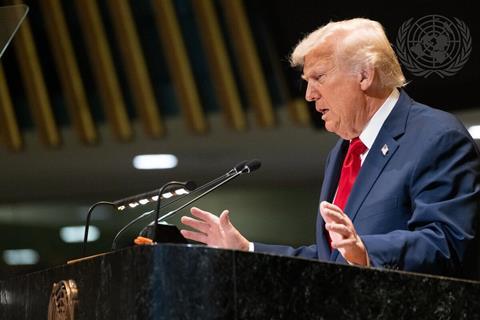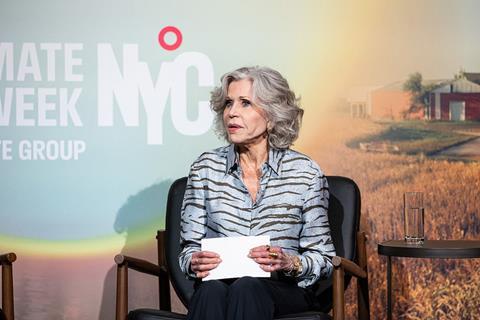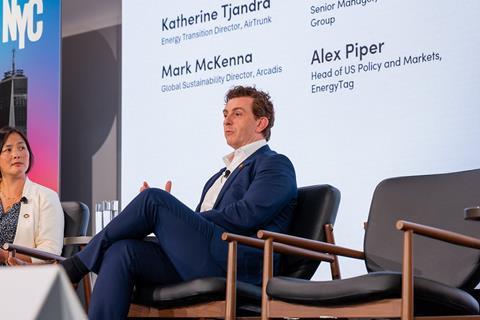US decision makers and businesses came together to launch the American Abundance and Innovation Program during Climate Week NYC, as Trump told world leaders to get away from the ‘green scam’ and warned that countries investing in renewable energy will see their economies suffer
Business leaders and environmentalists have continued to argue for non-partisan solutions to the climate crisis despite US president Donald Trump’s latest sceptical claims as he addressed the UN General Assembly on Tuesday.
During the second day at Climate Week NYC, a group of US decision makers and businesses came together to launch the American Abundance and Innovation Program. The aim of the programme is to enable US leaders to work together to accelerate new policy investment and implementation.
At the launch on Tuesday, actor and activist Jane Fonda addressed those still dragging their feet on climate action, saying that climate is affecting everything that matters, while David Eby, premier of British Columbia, said: “Just because it gets more challenging doesn’t mean it gets any less important.”
Nearby on the same day at the UN’s headquarters in New York, Trump claimed climate change predictions made by the UN and others “were wrong” and made by “stupid people”.
In his address to the General Assembly, he spoke for several minutes on climate change, condemning the EU for reducing its carbon footprint, which he said had taken a toll on its economy, and warning countries that have invested heavily in renewable energy that their economies will suffer.
The US president told the gathered world leaders to get away from the “green scam” – referring to climate policies – and that their countries “will fail” if they do not.
Global and US leaders are accustomed to Trump’s climate scepticism, and his latest intervention at the UN serves as another reminder of how hostile his administration is to policies that promote renewable energy and emissions reductions.
When news of his “green scam” claim broke mid-morning yesterday, a few Climate Week delegates were clearly perturbed by his unfounded claims but not surprised.
Speakers in the sessions generally did not refer specifically to his speech, but his wider impact on the policy landscape in the states and internationally has been a constant backdrop to the discussions.
In a session called ‘Beyond the echo chamber’, Benjamin Backer, founder and CEO of Nature Is Nonpartisan, lamented the fact that climate change has become part of the culture wars “even though it affects us all equally regardless of our political identity”.
Describing himself as a conservative environmentalist, he – like many other speakers over the last two days – made the point that climate solutions need momentum beyond political election cycles. He said: “It’s not just a Trump problem, it’s about the 2030s, 2040s, 2050s. We need to get the communities to the table if we are going to solve this challenge.”
He cited statistics to highlight how recent the polarisation of the debate actually is, saying that in 1990, 82% of Americans self-identified as environmentalists, whereas today it is less than 40% “because it’s got caught in a culture wars and we have to get it out of it”.
>> Also read: In pictures: Ed Miliband and Mark Ruffalo lead calls for accelerated action at Climate Week NYC
Others speaking at the conference, including Mete Coban, deputy mayor of London for environment and energy, demonstrated how cities and industries around the world are pushing on to accelerate climate action despite the US attitude.
He said: “This is a massive social justice issue. Cities have to be at the forefront of that because they know people much better. We talk about climate from a place of doom and gloom, it feels burdensome to people. But actually, it’s about wanting to live in a healthy city. No one wants to drink dirty water, why do we normalise breathing dirty air?”
Coban also revealed that London, as of yesterday, for the first time in history has achieved legal air pollution levels.
He went on to single out the construction industry and the great work the sector is doing to influence pollution levels in the city.
Meanwhile, Mark McKenna, global sustainability director, at Arcadis, appeared in a session on tackling the energy trilemma – security, affordability, and sustainability, He said: “We are facing a scenario where we cannot generate enough energy to support this exponential rise in demand from AI when we don’t know how fast it will go.”
He highlighted the pressure this demand places on infrastructure owners and the misconception that the energy transition is simple. He said that while everyone wants clean, affordable energy, no one wants the lights to go off, and the cost of capital remains a key barrier to deployment.
The previous day, Ursula von der Leyen, EU president, spoke about record investment in renewable energy – $2trillion in 2024 worldwide. She said: “This ambition and the stability is attracting capital. These days stability and predictability are very important values. Investments in renewables grew by 63% this year alone. But we know that more has to be done.”
She mentioned the recent launch of the Global Energy Transition Forum and the goal to triple renewable energy by 2030.
Building is a partner of The Climate Group



























No comments yet